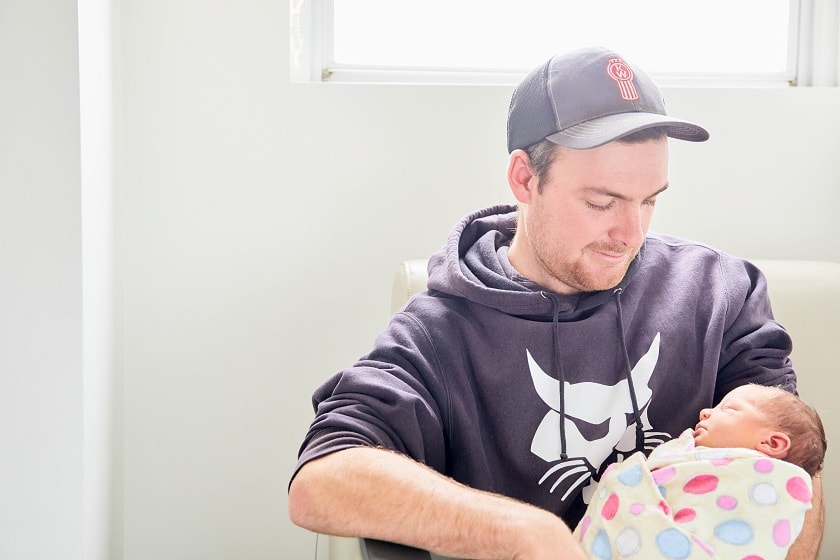Australian research indicates around one in 10 men experience perinatal mental health issues after their partner gives birth and while St John of God Raphael Services sees over 2,000 clients each year at its WA, NSW and Victorian community-based counselling services for new parents, only two per cent of these are dads.
Why are they so reluctant to seek help? Raphael Services Victoria West Manager, Danny Stone, cites a number of reasons:
1. Dads feel like they have to hold it together
Many new dads feel like they should know what to do or how to help their partners in the first few months of having a baby, particularly when their partner is struggling emotionally.
Add to this sleep disruption, and the many changes to our old routines and before long us dads can start to feel helpless and unable to ‘fix’ issues. This can lead to mental health issue like anxiety, depression and relationship issues.
The reality is there are ways out of the helplessness and there are ways we can help our partners but often this requires some help.
Having post-natal issues such as anxiety, depression and adjustment to parenthood is an ideal opportunity to make contact with an appropriately qualified support service and address the situation as a family.
Babies come into the world being able to tune in to how we parents are feeling and coping, so it’s an extra reason for parents to allow help when they need it.
2. Blasts from the past
Becoming a parent is a time of great emotion, both highs and lows and issues from your childhood or your relationship with your own parents can bubble to the surface when you least expect it.
Being a new parent is a window into how we ourselves were parented. This can see both positive and negative experiences and memories come to mind.
For some this can be distressing. Helping parents to see how their past may be influencing their present and providing them with tools and techniques to reduce their unwanted behaviours or reactions can be very liberating.
3. Concerns about stigma
Adam says that like some mothers, some dads are also concerned about what their friends, family or partner might think about them seeking emotional support.
According to an Australian Department of Health report (2009) almost half (45.5 per cent) of Australians will experience a mental health issue in their lifetime.
It’s important to acknowledge that everyone needs help at different points in their life and that taking action to connect with a support service is a sign of strength and will start you on the road to recovery.
4. My problems aren’t important enough
Some men report they feel they don’t have the ‘right’ to have problems because women do the bulk of physical work during pregnancy and early parenting.
Dads are key supports and hold equal responsibility for their children’s wellbeing. These are not just problems that affect mother and baby, but the whole family system is impacted. We see Dads as being vital to the health of the family system, because this is the reality.
If you are experiencing intrusive or distressing thoughts, feelings or memories, feeling anxious, on high alert, overwhelmed, having trouble sleeping because of worries or stress, if you’re drinking more than usual, can’t concentrate, feel miserable and can’t find enjoyment in activities you used to enjoy then it’s worth acknowledging them and talking to someone before these escalate.
There is a feeling of mastery and confidence we get when we stop ignoring and start acting, it’s very empowering.
5. Who can I turn to?
Adam says people are often unaware there are services available that specifically cater to the emotional needs of new parents.
Raphael Services is one of the few places where you can talk face-to-face with a psychologist, or mental health accredited allied service worker who specialises in perinatal mental health, for no cost.
Our caregivers provide a confidential space for you to talk freely. Most dads and mums report significant improvement once they’ve been able to discuss and work through their problems.
He notes that taking action to seek support when you need it is the key to addressing emotions and moving towards a closer relationship with your child and partner.
Sometimes we think that time will heal, but often this can mean the whole family suffering needlessly for longer.
Help is available and at Raphael Services, again it’s free! Just make a double appointment with your GP to discuss your referral. See the website for information on how to access the service closest to you.







